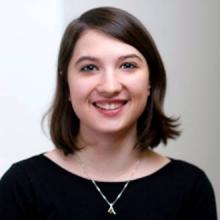Das erste Plenum ist mit den COST-Mitgliedern international besetzt und es wird erstmalig das erarbeitete /Manifesto /vorgestellt, eine Handreichung, die bis zum Ende des EU Projektes weiter gefüllt, bearbeitet und ergänzt werden wird. In der nachfolgenden Arbeitsgruppenphase wollen wir Euch, die Teilnehmer*innen, dazu einladen in den verschiedenen Arbeitsgruppen den diskutierten Themen und Fragen weiter auf den Grund zu gehen. Ziel ist es, Ergebnisse bzw. auch Fragen zu formulieren, welche Stabsstellen, Institutionen u.ä. und in welcher Form das Thema Mental Health in den Hochschulen verankert werden kann.
Dr. Stéphanie Gauttier
Assistant Professor at Grenoble Ecole de Management doing research at the intersection of information systems, human-computer interaction, and ethics. Stéphanie Gauttier specializes in qualitative methods, especially Q method. Stéphanie received her PhD in Information Systems Management from the University of Nantes. She has a masters in Political Sciences and a masters in Communication Sciences, and over five years of experience in the marketing industry. As a result, her research crosses disciplines and was applied to consumers (PhD), learners (EDUWORKS), and more recently to the healthcare domain (Responsible-Industry and GLASNOST). She was awarded an individual Marie Curie fellowship in 2018, was nominated on the list of 400 women in the NL across all industries in the "bright mind" category in 2018, and received the Brenner award for her work in Q-methodology in 2019. Stéphanie worked for over 5 years for the Publicis group in Russia before embarking on an academic career.
Dr. Brian Cahill
Dr Brian Cahill works in the Learning and Skills Analytics Lab of the Leibniz Information Centre for Science and Technology in Hannover as Grant Manager of the COST Action CA19117 on Researcher Mental Health. He is a Member of the Governing Board of EuroScience and was Chair of the Marie Curie Alumni Association from March 2016 to February 2018. In these roles, he engaged with early-career researchers on topics ranging from researcher career development, innovation, research funding, science communication, science policy, researcher pensions, research integrity, responsible research and innovation and many more.
He studied Mechanical Engineering in Ireland and moved to Germany in 1998 to take up a position with Hewlett Packard. He received his PhD for work in electrokinetically-driven fluid flow from the ETH Zurich in 2004 and subsequently carried out postdoctoral research in colloid and interface science at the University of Geneva. He was a Marie Curie fellow and Junior Research Group Leader at the Institute for Bioprocessing and Analytical Measurement Techniques in Heilbad Heiligenstadt (Germany), where his research interests focussed on measurement techniques for droplet-based microfluidics.
Dipl.-Psych. Martin Grund
Martin Grund is an experimental psychologist who investigates how brain-body interactions shape conscious tactile perception. Next to his basic research at the Max Planck Institute for Human Cognitive and Brain Sciences, he tries to make academia a place that integrates and enables the diversity of our society. 2016, he was the spokesperson of the Max Planck PhDnet and co-founded N², the network of more than 16.000 doctoral researchers at Germany's non-university research organizations. Since 2019, he heads the Science Forum Middle Germany. He is an advisor, speaker, and author on science communication and science policy, e.g., as a member of the BMBF think-tank #FactoryWisskomm.
Dr. Gábor Kismihók
ReMO Action Chair
Since I obtained my summa cum laude PhD in management sciences (information management) in 2012, I have been concentrating my research efforts on the multi-disciplinary area of matching processes between education, labor market, and individuals. Previously, I founded the Center of Job Knowledge Research at the Amsterdam Business School, University of Amsterdam (UvA). Since then I have supervised doctoral research at the intersection of the following fields: Knowledge Management, Learning Analytics, Data Science and Organizational Behavior. I published my research in various peer-reviewed international journals and book chapters, mostly in the fields of knowledge management and education (e.g.: Organizational Research Methods, Journal of Learning Analytics (JLA), Journal of Vocational Behavior, and British Educational Research Journal). I regularly review manuscripts for academic journals and conferences in the scientific community I am engaged with (e.g. Computers in Human Behavior, JLA, LAK).
As the coordinator of the FP7 MSCA ITN Eduworks project, I developed a multi-disciplinary training programme for graduate students. This included the development of a transversal (e.g. writing and communication skills) and a personalized, research specific training programme covering methodological (advanced statistical methods, research design) and technical (data science, basic coding skills) courses for social scientists. Utilizing the above-mentioned training, I organized a number of summer and winter schools. Further, I worked out a complex quality management system to monitor the training progress of a multi-disciplinary group of graduate students
Dr. Stefan Mol
ReMO Action project, Working Group 2 Chair
Stefan T. Mol is assistant professor in Organizational Behavior and Research Methods at the Amsterdam Business School of the University of Amsterdam and co-founder and board member of the Scilink foundation. He received his Master's degree in psychology at the University of Amsterdam in 2000, and his PhD in psychology in 2007, at the Institute of Psychology of the Erasmus University Rotterdam. Stefan was/is involved in the EU-Funded Leonardo da Vinci Ontohr, Med-Assess, Ontotech and Nursing AI projects. From 2013-2017 Stefan served on the Board of Management and Supervisory Board of the FP7 Marie Curie Initial Training Network (ITN) Eduworks (see http://www.eduworks-network.eu) a project aimed at the socio-economic and psychological dynamics of labour supply and demand matching processes at aggregated and disaggregated levels. Finally, Stefan was involved in the coordination of a university-wide project aimed at establishing Learning Analytics at the University of Amsterdam from 2013-2016, and its successor from 2017-2019.
Big Blue Button
Wir nutzen die Open-Source Software BigBlueButton. Um einen reibungslosen Ablauf zu garantieren empfiehlt es sich, den Open-Source Browser Chromium zu verwenden. Auch Firefox ESR (Extended Support Release) und Chrome funktionieren in der Regel reibungslos. Bei anderen Versionen von Firefox und bei Microsoft Produkten kann es zu Sound- und Videoproblemen kommen.


